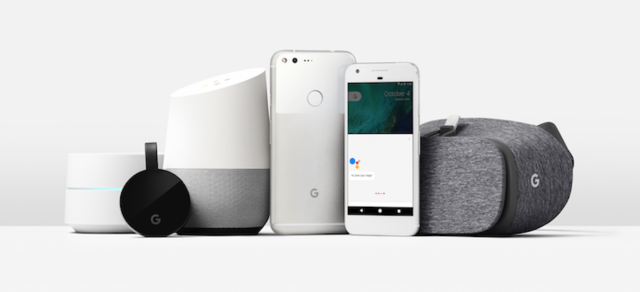Google’s Hardware Push Is All About AI
Google, the company that has done more than any other to democratize mobile computing, argues that we are moving away from a mobile-first world. Indeed, at the company’s wide-ranging product reveal on Tuesday in San Francisco, it rarely mentioned Android at all.
Yet all the products that Google announced at its event introduced either complemented or reacted to the phone. In addition to the Pixel smartphone itself, the first Daydream VR goggles and controller are aggressively priced at $79 in part due to their reliance on Daydream-ready smartphones such as the Pixel (as opposed to PC-based systems from HTC and Oculus). And the Chromecast Ultra seeks to provide more 4K programming options for TV watchers by leveraging the phone as a content source.

While the new Google Wi-Fi smart routers will certainly serve the range of connected products in the home, home wireless networks are also major carriers of smartphone traffic. Even the Google Home smart speaker seems to be designed to let people use the Google Assistant AI service when their phones aren’t available.
The Pixel phone may in part be aimed at providing consumers more choice in high-end Android smartphones, a class of product dominated by Samsung’s Galaxy models. However, as has always been Google’s goal for Android itself, the Pixel is a means, not an end. Its timing is not meant to seize on the opportunity of a growing market, but of a growing technology trend in which the company has a particular advantage: artificial intelligence. Google Assistant is only available on two of the products Google announced: the Pixel and the Google Home speaker. However, all of the products Google announced at its launch event this week serve its AI efforts.
User interface was once the great separator between competing consumer electronics products, but with the rise of services such as Google Assistant, Apple’s Siri, and Microsoft’s Cortana, the frontier is now shifting from how devices facilitate usage to how they facilitate assistance. As Google readily shares, a key to building its AI personalization efforts has been the development of its knowledge graph built through tracking usage of the web and its mobile platforms and apps. The company’s intimate knowledge of the behavior of vast numbers of consumers has helped build its AI.
But as Google pushes AI to the fore of its product experiences, it can not only learn more about what you do, but what you’re considering doing and potentially influence your choices even more than it does today. In time, you may rely more on Google for bigger life decisions, such as wedding venues and university selections, that could be even more valuable to its advertisers. Google knows more and more about your past, and by aggressively pursuing next-generation experiences such as VR, it can continue to learn about you in the future.
When Google created Alphabet as a new umbrella company last year, it moved moonshots relating to subjects such as health and connectivity out of Google and into other Alphabet companies. Many of Google’s future-focused technologies have moved to other Alphabet companies, However, AI research remains within Google to elevate the company’s trade-off proposition—exchanging personal information for valued services—that it has been offering since it started placing little text ads next to search results. Moving from tracking behavior to influencing behavior can only enrich Google’s delivery of services to you—and delivery of you to advertisers.
Fast Company , Read Full Story
(16)


